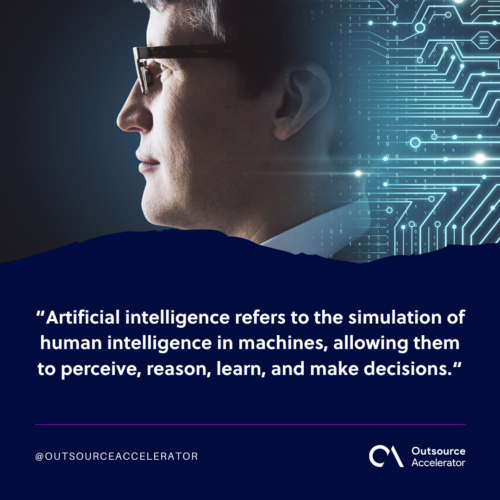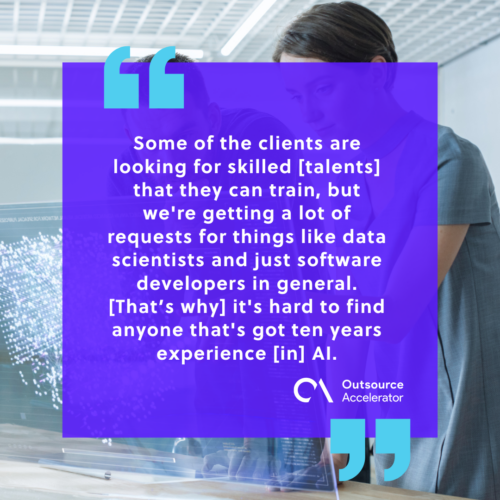Why you need to start AI and machine learning training

The adoption of artificial intelligence (AI) offers numerous advantages that businesses simply cannot afford to ignore today.
AI and machine learning enable the automation of repetitive tasks, reallocating resources to more strategic initiatives. This efficiency gain translates to cost savings and improved productivity, allowing businesses to achieve better outcomes with just fewer resources.
Companies are relying more on AI not out of laziness but rather due to necessity and the opportunities it provides. However, many struggle to build a workforce equipped with the necessary skills to leverage these growing technologies effectively.
One strategy to counter this challenge is to implement AI and machine learning training among existing employees and new talents.
In the 476th episode of the Outsource Accelerator Podcast, Mike Larcher, the Founder and CEO of Outsourced, discussed AI and machine learning, including the challenges to acquiring more talent in this field.
About AI and machine learning
Artificial intelligence refers to the simulation of human intelligence in machines, allowing them to perceive, reason, learn, and make decisions.

It covers a broad range of techniques, including:
- Machine learning
- Natural language processing
- Computer vision
- Robotics
On the other hand, machine learning (ML) is a subset of AI that specifically focuses on enabling machines to learn from data and improve over time without being explicitly programmed.
These technologies have revolutionized various industries, from healthcare and finance to manufacturing and marketing.
According to Mike, “The market’s definitely shifted due to AI in terms of some of the multiples and depending on the category that you’re in.”
Why is it hard to find AI and machine learning professionals?
Despite the undeniable benefits that modern technology brings, the demand for professionals proficient in advanced tech tools often outstrips the available talent pool.
This scarcity poses a significant barrier for businesses striving to harness the full potential of modern technology to drive innovation, especially since AI professionals “[are] something that’s only come to the demand quite recently,” Outsourced’s founder added.
Further, several factors contribute to this challenge:
High-demand, low supply
The high-demand, low-supply scenario in the AI and machine learning job market stems from the explosive growth of AI and ML applications across diverse industries.
Businesses increasingly embrace AI-driven solutions to gain a competitive edge. The demand for professionals proficient in quality assurance and web development is skyrocketing instead of AI-related roles.
Mike explained, “Some of the clients are looking for skilled [talents] that they can train, but we’re getting a lot of requests for things like data scientists and just software developers in general.
[That’s why] it’s hard to find anyone that’s got ten years experience [in] AI.

Complexity of skill requirements
AI and ML roles require a diverse skill set, including expertise in mathematics, statistics, computer science, and domain-specific knowledge.
Proficiency in programming languages like Python or R is also crucial for implementing machine learning models and effectively working with large datasets.
Most professionals possessing these skills are already working either as data scientists or software engineers. Therefore, recruiting them for AI roles adds to the challenge.
Resistance to AI changes
Some specialists may be hesitant to transition into AI and ML roles due to fear of job displacement or the thought that “AI is going to make us redundant.”
Overcoming this resistance and upskilling existing employees is essential for organizations aiming to harness the power of artificial intelligence.
However, Mike reassures, “I think we’re a long way off [and] it’s not happening this year [or] next year.”.
Why you should consider AI and machine learning training
Despite the challenges in finding qualified professionals, investing in machine learning and AI training allows organizations as well as professionals to leverage the following:
Future-proof workforce
Investing in AI and machine learning training is imperative for individuals and organizations seeking to future-proof their workforce.
As AI and ML technologies continue to penetrate various industries, acquiring skills in these fields is crucial for ensuring long-term employability and relevance in the job market.
Professionals who undergo AI and machine learning courses or webinars equip themselves with knowledge and expertise in modern technology.
Apparently, there are “so many grads now and universities jumping on this and training people up in, in AI and machine learning,” the CEO quoted.
Companies and their people can secure their foothold in the evolving industry as they adapt to AI trends.
Meet growing industry demands
The transformative potential of AI and ML technologies pushes enterprises to meet the growing industry demands for qualified talent.
Firms that provide AI and machine learning training equip their staff with specialized knowledge needed to excel in the roles integral to driving innovation.
Optimize AI implementation
Effective integration of AI and ML technologies necessitates knowledgeable personnel capable of developing, deploying, and maintaining complex algorithms.
Through targeted AI and machine learning training initiatives, companies can cultivate in-house expertise and ensure that their teams have what it takes to implement AI solutions effectively.
Drive innovation internally
AI and machine learning training empower employees to think creatively and explore novel resolutions to business challenges.
By fostering a culture of innovation, organizations can drive continuous improvement and stay ahead of competitors in the fast-paced digital landscape.
Maximize ROI on AI investments
Furthermore, AI and machine learning training enable organizations to maximize their return on investment (ROI) in AI initiatives.
By upskilling existing employees, companies can avoid the need to hire expensive external talent, reducing recruitment costs and minimizing reliance on external contractors.
The future of AI and machine learning training
As AI and ML continue to grow, so do the methods and approaches to training in these fields.
Traditional education pathways, such as university degrees and online courses, will remain vital for building foundational knowledge. However, the rise of immersive learning experiences as part of AI and machine learning training remains significant.
As Mike said, “Something you might’ve had to have done onshore, you could now do offshore through the power of AI.”
For businesses, know that “this whole new category of people [using] AI” transforms how an industry works, which is a positive development.
If you want to learn more about how AI continuously transforms businesses, Mike Larcher would be happy to connect with you.
Visit the official website of Outsourced and listen to episode 476 of the OA podcast here.







 Independent
Independent




